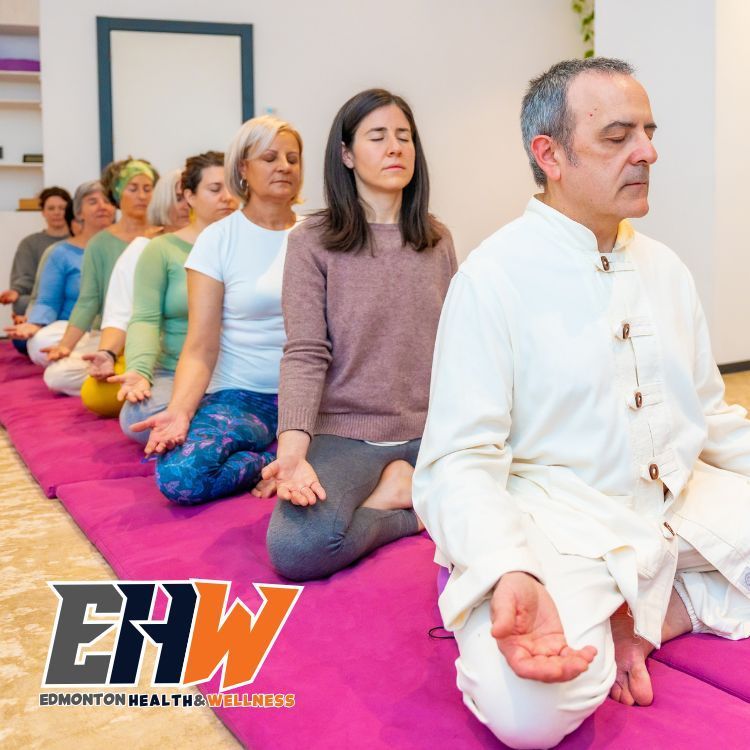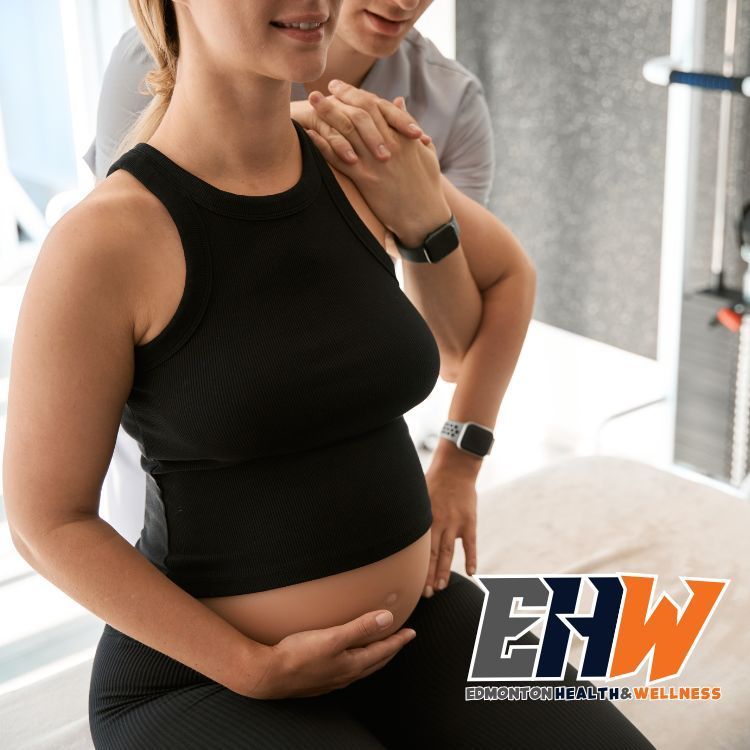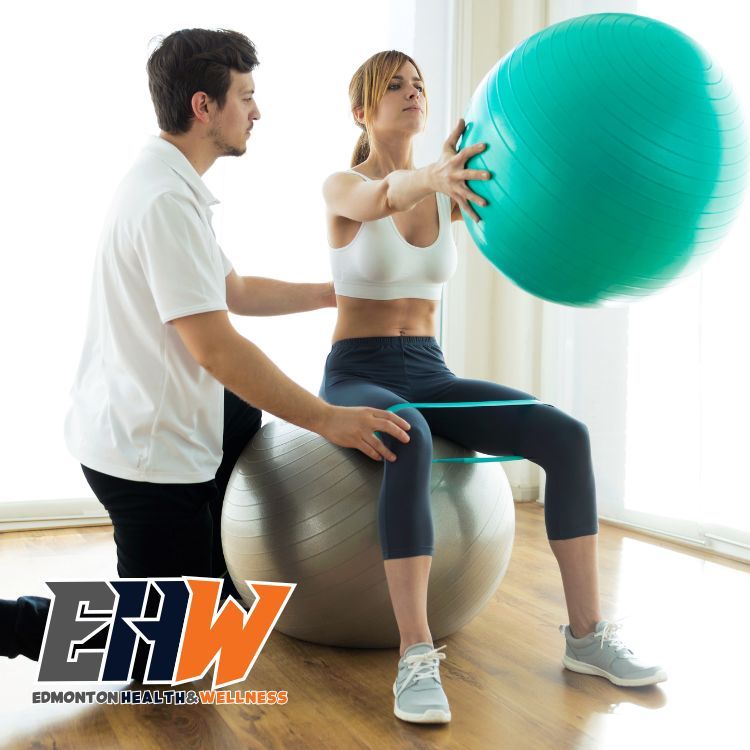The Beginner's Guide to Meditation: How to Get Started with Edmonton Health and Wellness
Finding Balance and Peace in Everyday Edmonton

In today’s fast-paced world, finding moments of calm can feel like an impossible challenge.
Meditation
offers a powerful solution—an ancient practice embraced for centuries to promote inner peace, reduce stress, and enhance overall well-being. At
Edmonton Health and Wellness, we believe in empowering our clients with holistic tools like
meditation
to support both physical and mental health. Whether you’re a busy professional or simply seeking greater balance,
meditation
provides a pathway to a healthier, more fulfilling life.
Research supports the profound benefits of meditation. Regular practice has been shown to reduce anxiety, improve focus, enhance self-awareness, and even positively impact physical health by lowering blood pressure and improving sleep. Let’s explore how to get started with meditation and integrate it into your daily life.
The benefits of meditation extend far beyond just relaxation. Research has shown that regular meditation practice can have a profound impact on mental, emotional, and even physical health. It has been linked to reduced anxiety, improved focus and concentration, increased self-awareness, and heightened feelings of happiness and contentment. Additionally, meditation has been shown to lower blood pressure, boost the immune system, and promote better sleep. With such an array of positive effects, it's no wonder that meditation has gained popularity and is embraced by people from all walks of life.
The Read:
- Understanding Meditation
- Creating a Meditation Space
- Basic Meditation Techniques for Beginners
- Establishing a Meditation Routine
- Overcoming Common Challenges
- Integrating Meditation into Daily Life
- Tracking Progress and Reflection
- Seeking Further Guidance and Resources
Understanding Meditation
To begin our journey into meditation, it's essential to grasp what meditation truly entails and dispel any misconceptions surrounding the practice. At its core, meditation is a mental exercise that involves training the mind to achieve a state of heightened awareness and focus. Contrary to popular belief, meditation is not about emptying the mind of thoughts or achieving complete silence. Instead, it is about cultivating a non-judgmental and compassionate awareness of one's thoughts, emotions, and sensations in the present moment.
Meditation practices can vary, ranging from concentration-based techniques to mindfulness-based approaches. Concentration meditation involves focusing on a single point of attention, such as the breath, a mantra, or an object, to cultivate a sense of concentration and mental clarity. On the other hand, mindfulness meditation involves paying deliberate attention to the present moment without judgment, allowing thoughts, sensations, and emotions to arise and pass without attachment. Both approaches have their benefits and can be explored to find the one that resonates most with you.
It's important to note that meditation is not a quick fix or an instant solution. It requires patience, commitment, and regular practice. Just like any skill, it takes time to develop and deepen your meditation practice. The key is to approach it with an open mind and a willingness to embrace the journey, understanding that the true essence of meditation lies in the process itself, rather than achieving any specific outcome. So, let go of any preconceived notions you may have and embark on this exploration of self-awareness and inner peace.
Creating a Meditation Space
Creating a dedicated space for meditation can greatly enhance your practice and help you establish a sense of tranquility and focus. While it's possible to meditate anywhere, having a designated area solely devoted to your practice can provide a physical and mental anchor for your meditation routine. Here are some key considerations when creating your meditation space.
First and foremost, choose a quiet and peaceful location in your home or outdoors where you can practice without distractions. It could be a spare room, a corner of your bedroom, or even a serene spot in your garden. Selecting a space with minimal noise and interruptions will allow you to cultivate a deeper sense of stillness and concentration during your meditation sessions.
Next, make your meditation space comfortable and inviting. Consider using a meditation cushion, also known as a zafu, or a comfortable chair that supports an upright posture. Maintaining good posture is important for the flow of energy and overall comfort during meditation. You may also choose to add elements that promote a serene ambiance, such as soft lighting, candles, incense, or calming music. Experiment with different scents, sounds, and lighting options to find what resonates with you and enhances your meditation experience.
By consciously creating a dedicated meditation space, you are sending a signal to your mind and body that this is a sacred space for stillness and self-reflection. Returning to this space regularly will help you establish a sense of familiarity and routine, making it easier to enter a meditative state more effortlessly. Remember, your meditation space is a sanctuary for inner peace, so take the time to curate it according to your preferences and make it a haven for your practice.

Basic Meditation Techniques for Beginners
When starting your meditation practice, it's helpful to begin with simple techniques that allow you to build a foundation of mindfulness and awareness. Here are a few basic meditation techniques that are accessible for beginners:
- Mindful breathing: This technique involves focusing your attention on the breath. Find a comfortable position, either sitting or lying down, and bring your awareness to the sensation of the breath as it enters and leaves your body. Notice the natural rhythm and flow of your breath, without trying to control or manipulate it. Whenever your mind wanders, gently redirect your attention back to the breath. This practice cultivates present-moment awareness and helps calm the mind.
- Body scan meditation: In this technique, you systematically bring your attention to different parts of your body, starting from the top of your head and moving down to your toes. With each body part, observe any sensations, tension, or relaxation that you may notice. This practice promotes body awareness, relaxation, and a deeper connection with your physical self. It also helps to release any tension or stress held in the body.
- Loving-kindness meditation: Also known as meta meditation, this practice involves cultivating feelings of love, kindness, and compassion towards yourself and others. Begin by directing kind wishes and positive intentions towards yourself, such as "May I be happy, may I be healthy, may I live with ease." Then, gradually extend these wishes to loved ones, neutral individuals, and even difficult people or situations. This practice nurtures a sense of connectedness, empathy, and goodwill towards all beings.
Remember, as a beginner, it's natural for your mind to wander during meditation. When you notice your thoughts drifting away, gently bring your attention back to the chosen focal point of your meditation, whether it's the breath, the body, or loving-kindness phrases. Be patient and compassionate with yourself as you navigate the process. Over time and with consistent practice, you will develop greater focus, presence, and a deeper understanding of your inner world.
Establishing a Meditation Routine
Consistency is key when it comes to reaping the benefits of
meditation. Establishing a regular
meditation
routine not only helps you make
meditation
a habit but also allows you to deepen your practice over time. Here are some tips to help you establish a meditation routine:
- Set aside dedicated time for meditation: Decide on a specific time each day that works best for you to engage in your meditation practice. It could be early morning, before bed, or any other time that aligns with your schedule and allows for minimal distractions. Treat this time as sacred and non-negotiable, prioritizing your meditation practice just like any other important commitment in your life.
- Start with short sessions and gradually increase duration: As a beginner, it's advisable to start with shorter
meditation
sessions, such as 5-10 minutes, and gradually extend the duration as you become more comfortable. This approach prevents feelings of overwhelm and allows you to build endurance and concentration gradually. Over time, you can aim for longer sessions, such as 20-30 minutes or more, depending on your preferences and availability.
By establishing a consistent meditation routine, you create a container for your practice, signaling to your mind and body that this is a designated time for inner reflection and self-care. It helps to maintain a sense of discipline and commitment, even on days when you may feel resistance or restlessness. Remember that every meditation session is an opportunity for growth and self-discovery, so embrace the routine and let it become an integral part of your daily life.
Overcoming Common Challenges
Meditation
is a practice that can bring about profound transformation, but it is not without its challenges, especially for beginners. Here are some common challenges that may arise during
meditation
and strategies to overcome them:
- Dealing with a wandering mind and distractions: It's natural for the mind to wander during meditation, and thoughts and distractions may arise. Instead of getting frustrated or discouraged, approach these moments with gentle curiosity. Acknowledge the thoughts or distractions without judgment, and then gently bring your attention back to your chosen focal point, such as the breath or body sensations. Remember, each time you redirect your focus, it's an opportunity to cultivate mindfulness and strengthen your concentration.
- Managing physical discomfort during meditation: Sitting still for an extended period may cause physical discomfort or even pain. It's important to find a posture that is comfortable and sustainable for you. Experiment with different sitting positions, such as sitting on a cushion, using a meditation bench, or sitting in a chair with an upright spine. If discomfort arises during meditation, explore gentle movements or adjustments to release tension. You can also try incorporating gentle stretches or yoga poses before meditation to prepare your body for stillness.
- Addressing resistance and skepticism towards meditation: Some beginners may experience resistance or skepticism towards meditation, questioning its effectiveness or finding it challenging to commit to a regular practice. It can be helpful to remind yourself of the potential benefits and to approach meditation with an open mind. Start with small, manageable goals and be patient with yourself. Reflect on the positive changes you notice over time, such as increased clarity or a greater sense of calm. Engage in conversations or seek support from others who have experienced the benefits of meditation to stay motivated and inspired.
Integrating Meditation into Daily Life
While setting aside dedicated time for formal
meditation
sessions is crucial, integrating mindfulness and
meditation
into your daily life can amplify the benefits and extend the practice beyond the cushion. Here are some ways to incorporate mindfulness into your everyday activities:
- Mini-meditations throughout the day: Take brief pauses during the day to engage in mini-meditations. It can be as simple as taking a few conscious breaths, grounding yourself in the present moment, and bringing awareness to your surroundings. These mini-meditations serve as reminders to cultivate mindfulness and bring you back to the present amidst the busyness of daily life.
- Mindfulness in daily activities: Practice bringing mindfulness to ordinary activities, such as eating, walking, or washing dishes. Engage your senses fully in the experience, savoring each bite, feeling the sensation of your feet touching the ground, or being present with the soapy water and the warmth of the dishes. By infusing mindfulness into these activities, you can transform them into opportunities for relaxation, presence, and gratitude.
- Finding support through meditation apps or local meditation groups: Utilize technology to your advantage by exploring meditation apps that offer guided meditations, timers, and mindfulness reminders. These apps can help you stay consistent and provide a sense of structure and guidance. Additionally, consider joining local meditation groups or communities where you can connect with like-minded individuals, attend group meditation sessions, and learn from experienced practitioners. Being part of a community can provide support, encouragement, and a sense of shared purpose.
Integrating meditation into your daily life allows you to extend the benefits of mindfulness beyond formal practice. By weaving mindfulness into your routines and engaging in regular mindfulness check-ins, you cultivate a deeper sense of presence, peace, and well-being throughout your day. The key is to find opportunities for mindfulness in the ordinary and to approach each moment with an open and receptive mindset.
Tracking Progress and Reflection
Tracking your progress and engaging in regular reflection is an essential aspect of a
meditation
practice. It allows you to gain insights, observe patterns, and celebrate milestones along your
meditation
journey. Here are some ways to track your progress and engage in reflection:
- Keeping a meditation journal: Maintain a dedicated journal to record your meditation experiences. After each session, take a few moments to jot down any observations, thoughts, or feelings that arose during your practice. Note any insights or shifts in your awareness. Over time, as you review your entries, you'll be able to see patterns, track your progress, and gain a deeper understanding of your meditation practice.
- Reflecting on the positive changes and benefits: Take time to reflect on the positive changes and benefits you've experienced through meditation. Notice how it has influenced your daily life, relationships, and overall well-being. Reflect on the moments of increased clarity, emotional balance, or a greater sense of connection with yourself and others. Celebrate your milestones, no matter how small, and acknowledge the growth you've achieved through consistent practice.
Reflection allows you to deepen your self-awareness and appreciation for the transformative power of meditation. It serves as a reminder of the progress you've made and provides motivation to continue on your meditation journey. Embrace the practice of reflection with an open and curious mind, recognizing that the true benefits of meditation extend beyond the meditation cushion and permeate all aspects of your life.
Seeking Further Guidance and Resources
As you continue to deepen your meditation practice, seeking further guidance and utilizing additional resources can greatly support your growth and exploration. Here are some avenues to consider:
- Meditation teachers and retreats: Engaging with experienced meditation teachers can provide personalized guidance, answer questions, and offer insights into your practice. Look for reputable teachers in your area or consider attending meditation retreats or workshops where you can deepen your understanding and receive direct instruction. These opportunities for in-person guidance can offer invaluable support as you progress on your meditation path.
- Online resources and communities: The internet is a vast source of meditation resources, including guided meditations, articles, podcasts, and online courses. Explore reputable websites, meditation apps, and virtual communities where you can access a wealth of information, connect with like-minded individuals, and participate in virtual meditation sessions or discussions. Engaging with online resources and communities can provide ongoing inspiration, learning, and a sense of connection even from the comfort of your own home.
Remember to approach further guidance and resources with discernment, seeking reputable sources and individuals with a solid background in meditation. Trust your intuition and choose what resonates most with you. Embrace the opportunity to learn from different perspectives and approaches, but ultimately, trust in your own inner wisdom and experience as you navigate your meditation journey.

Embarking on the journey of meditation as a beginner can be both exciting and daunting. However, with the right understanding, tools, and mindset, you can begin to cultivate a practice that brings peace, self-awareness, and inner transformation. Remember that meditation is a lifelong journey, and the true essence lies in the process itself, rather than achieving any specific outcome. Embrace the practice with an open mind, patience, and self-compassion, knowing that each moment of stillness and presence is a step forward on your path.
As you integrate
meditation
into your daily life, stay committed to establishing a routine, seeking further guidance when needed, and reflecting on your progress. Embrace the challenges and setbacks as opportunities for growth, knowing that consistency and self-reflection are key to deepening your practice. Remember that the benefits of
meditation
extend beyond the meditation cushion, permeating your daily life and relationships.
So, take a deep breath, find a quiet corner, and embark on this transformative journey. May your meditation practice bring you clarity, peace, and a deeper connection with yourself and the world around you. Allow meditation to be your guide as you navigate the ups and downs of life, bringing you back to the present moment and the essence of your true self.
Contact Us: Start Your Journey Today!
Meditation is more than a practice—it’s a powerful tool for enhancing your health and well-being. At Edmonton Health and Wellness, we’re here to support you every step of the way.
💥 Special Offer: Enjoy a $100 Initial Visit Voucher! 💥
Take the first step toward a healthier, more balanced life. Whether you’re just starting out or looking to deepen your practice, we can help you integrate mindfulness into your daily routine.
📞 Call us today at
587-412-5173
💻 Visit
www.EdmontonHealthAndWellness.com
Embrace the journey of meditation and experience the transformative benefits it can bring to your life. Contact us now and let’s get started!









